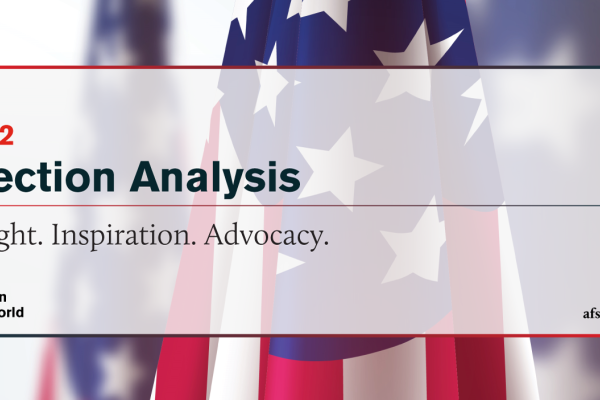Insights on Agriculture & AgTech
92 total results. Page 2 of 4.
On March 14, 2024, Corteva Agriscience LLC (Petitioner) filed an antidumping duty (AD) and countervailing duty (CVD) petitioners on 2,4-Dichlorophenoxyacetic Acid (2,4-D) from the People’s Republic of China and India.
ArentFox Schiff will host the Food Policy Impact Summit at our Washington, DC, office on February 27-28, 2024. FDA Practice Leader Karen Carr and Partner Rachel Remke will present on timely developments impacting the food and nutrition regulatory landscape.
On November 2, 2023, the US Court of Appeals for the Eighth Circuit vacated a 2021 decision by the US Environmental Protection Agency (EPA) that had halted the use on agricultural crops of the pesticide product known as chlorpyrifos.
AgTech Industry Group Co-Leader Karen Carr will present on two panels at the American Agricultural Law Association’s (AALA) 2023 Annual Educational Symposium in Charlotte, North Carolina, on November 9-11.
Effort Supports $1 Billion Commitment to Facilitate Deployment of Wireless AgTech Networks
The energy transition and increased public focus on environmental issues have strained the existing regulatory regime including the National Environmental Policy Act (NEPA). NEPA directs agencies to conduct environmental assessments before taking “major federal actions.”
The Federal Communications Commission (FCC) has announced the next public meeting of its Precision Agriculture Connectivity Task Force, scheduled for July 11, 2023.
AgTech Industry Group Co-Leaders Karen Carr and Alexander Spiegler will speak at the International Bar Association’s 9th Annual IBA World Life Sciences Conference.
Many major companies have announced a blueprint to minimize their carbon footprint. Some companies have gone so far as to proclaim that they will achieve “net zero” emissions in the near future. To accomplish their climate goals, many have turned to purchasing products called “carbon offset credits.
The Federal Communications Commission (FCC) has announced the next public meeting of its Precision Agriculture Connectivity Task Force (Task Force), which has been scheduled for March 28, 2023.
A bipartisan group of lawmakers in Congress is set to introduce a bill that if enacted would direct CFIUS to consider the needs of the agriculture industry when reviewing foreign investment and ownership in domestic businesses.
ArentFox Schiff will host the Food Policy Impact Conference at our Washington, DC, office on February 7-8. AgTech Industry Group Co-Leader Karen Carr is scheduled to present.
The principal legislative focus for the agriculture sector in 2023 will be the new Farm Bill, which sets the policies for most of the country’s agriculture programs, authorizing mandatory and discretionary spending for assistance related to food and farms.
The Republican leadership in the US House of Representatives has named Rep. Andy Harris (R-MD-1) chair of the Appropriations Subcommittee on Agriculture, Rural Development, Food and Drug Administration. As its name suggests, the Subcommittee has jurisdiction over the US Department of Agriculture.
On January 20, 2023, the US Food and Drug Administration’s (FDA) final rule on food traceability will take effect. Regulated entities will have a three-year compliance period, with a current compliance date of January 20, 2026. But what exactly will companies have to do to comply with the new rule?
Partner Andy Sawula and Associate Sam Rasche discuss how to respond to EPA Information Requests.
Under intensive regulatory, commercial, and academic oversight, and notwithstanding its widespread and rapid rate of adoption, biotechnology has produced huge gains in well-being that have flowed to society without any evidence of adverse health or environmental effects.

Americans woke up on Wednesday, November 9, immediately realizing something was different. On their televisions and other devices, they only saw commercials for products, vacation spots, and reality shows.
The Biden Administration is using a comprehensive set of tools to stick closely to campaign promises around — and the public demand for — climate action.
Karen Carr and Malerie Ma Roddy will present at the 2022 AALA Annual Agricultural Law Educational Symposium on Friday, November 11, 2022.
Hydroponic production has become increasingly popular in American agriculture. Historically, fruits and vegetables had been grown exclusively on traditional soil-based farms. Hydroponics, by contrast, are typically grown in greenhouses and urban farms using innovative new technologies.
On September 13, 2022, a federal court in San Francisco decided an NGO-led challenge to the US Department of Agriculture’s (USDA) final rule establishing a national standard for the disclosure of bioengineered foods.
AgTech Industry Group Co-Leader Karen Carr will join a panel discussion on organic policy at the International Fresh Produce Association’s The Washington Conference on September 28.
President Biden has revealed the next areas of focus in his effort to protect the United States’ technological leadership and economic competitiveness: biotechnology, biomanufacturing, and the bioeconomy.
Agricultural Technology Industry Group Co-Leader Karen Ellis Carr will present in a webinar hosted by the American Agricultural Law Association (AALA) on August 30.